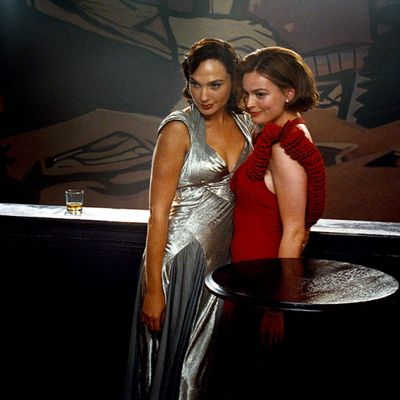
Kenneth BranaghÔÇÖs latest Agatha Christie film begins with a gritty, black-and-white prologue set in the trenches of World War I, in which we learn the incredibly disturbing origins of Hercule PoirotÔÇÖs mustache. ThatÔÇÖs not all. In Death on the Nile, Branagh films a riverside hotel in Egypt like it was the grand Elvish sanctuary Rivendell from The Fellowship of the Ring, all swooping cameras and soaring music. He shoots the Karnak, the steamboat with which our protagonists will travel the Nile, like heÔÇÖs just been handed the reins to Titanic 2.
If youÔÇÖre still reading this, then perhaps you might enjoy the movie. I did.
Branagh has never been a stranger to bombast, whether he was doing Shakespeare (think of the bellowing portent of Henry V, or the careening cameras and swirling orchestral crescendos of Much Ado About Nothing) or making a period horror adaptation (Mary ShelleyÔÇÖs Frankenstein is so visually histrionic it makes Bram StokerÔÇÖs Dracula look like Robert BressonÔÇÖs Pickpocket). When given the freedom, he can be one of the most overheated of directors, but the excess rarely feels cynical or cheap. In fact, it feels personal. You sense that he wants you to get excited about this stuff because he gets so excited about this stuff.
But to add such wild flourishes to a cozy Agatha Christie mystery? Well, why not? The characters in Death on the Nile, as conceived by Christie and now reimagined and remixed by Branagh and screenwriter Michael Green, are extreme sorts themselves. Consider the rather spectacularly vicious love triangle of Linnet Ridgeway (Gal Gadot), the beautiful heiress who has stolen hunky Simon Doyle (Armie Hammer) right out from under her best friend and his fianc├®e Jacqueline de Bellefort (Emma Mackey), all stuck on a boat on the Nile together. There isnÔÇÖt a stiff upper lip to be found anywhere. Quite the opposite: Everybody might as well be drooling, out of lust or jealousy or rage or some combination thereof.
Meanwhile, thereÔÇÖs LinnetÔÇÖs rampaging communist-socialite godmother Marie Van Schuyler (Jennifer Saunders) and her devoted nurse Mrs. Bowers (Dawn French), who, not having much money herself, canÔÇÖt exactly rail smugly against the ravages of wealth. Or soulful, pistol-packing jazz singer Salome Otterbourne (a wonderful Sophie Okonedo, playing a character who was a romance novelist in ChristieÔÇÖs original) and her manager and niece Rosalie (Letitia Wright), who is desperately in love with PoirotÔÇÖs good pal and confidante Bouc (Tom Bateman).
Even the seemingly mild-mannered secondary characters ÔÇö such as LinnetÔÇÖs cousin and lawyer Andrew Katchadourian (Ali Fazal) and meek little Dr. Windlesham (Russell Brand) ÔÇö eventually reveal that they have all sorts of crazy passions raging just beneath their calm, composed surfaces. ThatÔÇÖs classic Christie, of course; think of all those quiet country folks with twisted, possibly murderous inner lives. Branagh merely turns subtext into text by placing everyone in an elegantly warped, hothouse melodrama, which goes nicely alongside all that murdering and backstabbing.
And the cast, by and large, delivers. (I know some of them have been canceled or semi-canceled since the movie was made, but whatÔÇÖs a 2019-shot blockbuster to do?) Despite the memes, the not particularly versatile Gadot manages to be rather delightful as Linnet, the kind of impossibly gorgeous, impossibly wealthy head-turner who consumes all the energy in any room she enters. ThereÔÇÖs a weirdly na├»ve entitlement to this character that Gadot channels well: SheÔÇÖs stolen her best friendÔÇÖs man, and she clearly thinks she deserves him. Given where the story soon goes, the whipsawing emotions everyone else feels toward Linnet become crucial to the central mystery.
Speaking of which, I saw the 1978 Peter Ustinov Death on the Nile at a very impressionable age and never forgot the whodunitÔÇÖs intricate, surprising solution. So I was a bit wary of this adaptation. How would it work for those of us whoÔÇÖve always known who done it? Much to my surprise, Branagh not only finds ways to hold our attention, he and Green also introduce some engaging new wrinkles to the story. Now, everything seems to turn on love ÔÇö love forbidden, love indulgent, love suppressed, love betrayed or unrequited. Each character is contending with romantic despair on some level (including BranaghÔÇÖs Poirot himself, which is what that whole mustache prologue turns out to be about), and that in turn enhances the central triangle between Linnet, Simon, and Jacqueline. (ThereÔÇÖs also a running bit involving various CGI creatures in and along the Nile gobbling up other CGI creatures, as if to remind us that what weÔÇÖre seeing is really just our animal impulses coming to the fore. Alligators eat birds, and people kill people. Okay.)
ThereÔÇÖs a lot of fat here, to be fair. Christie loved to spend time introducing her characters; that can take up a lot of screen time, and itÔÇÖs actually a while before we get to the main mystery. The movie is sometimes slow when you want it to be fast, and too fast when you want it to calm down. It does feel like a mistake to deliver certain key bits of sleuthing in rapid-fire dialogue exchanges while the picture languishes so much in other, less narratively significant scenes. Even so, it all winds up being fairly likable, a pleasant diversion whose grandiosity just becomes part of its quaint charm. And it feels old-fashioned in this sense: You can duck into it for a couple of hours to lose yourself in the spectacle of these people being demonically nasty to each other, and thus get away from the more mundane nastiness of the world. For all that bombast, itÔÇÖs the simplest of exchanges. Branagh seems to be having a grand old time, so we might as well, too.
More Movie Reviews
- Rust DidnÔÇÖt Choose to Echo Its Tragedy, But It Courses Through the Film
- Wicked Is As Enchanting As It Is Exhausting
- ÔÇÿSome People Call It the City of Dreams, But I DonÔÇÖtÔÇÖ


